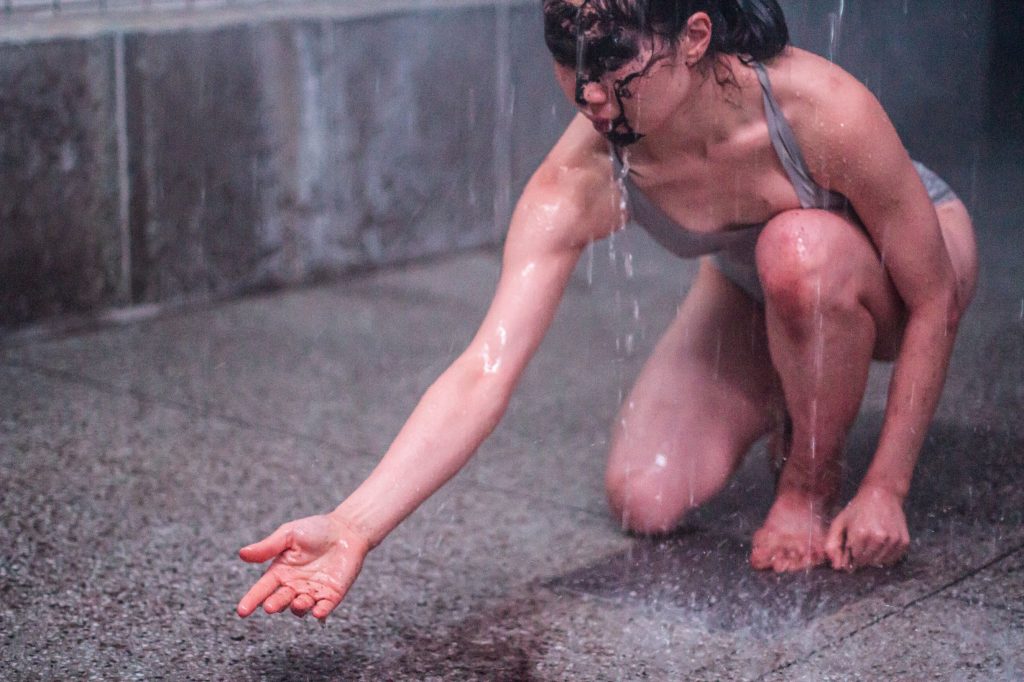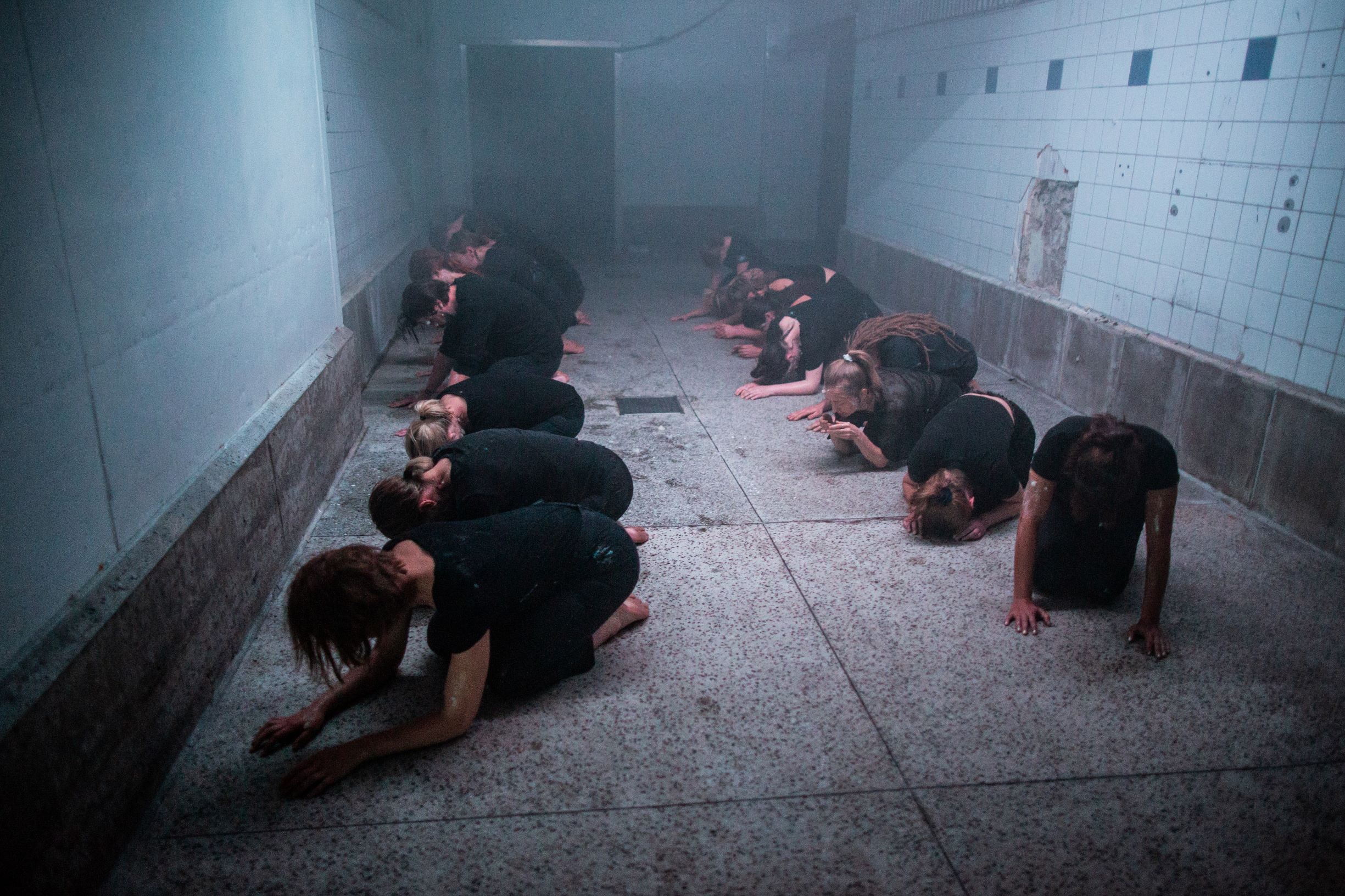
 (2 / 5)
(2 / 5)
The worst piece of theatre I ever saw was at Edinburgh in 2013. Two pretty, very posh girls had hired one of the stages in the Pleasance to talk about how they were so posh and so privileged that they couldn’t feel empathy. Their life had just been so damn easy, they couldn’t even imagine what hardship was like. They had had such an easy ride, they claimed, they couldn’t even cry. They proceeded, over the next hour, to demonstrate this by showing video and audio clips of sad things and then showing that they were unaffected by them; Bambi dies, nothing, Pheobe in Friends gives up her babies, nothing. They began rubbing each others’ eyes with onions – still nothing. The video clips got increasingly graphic until the point where the show became offensive. They started playing audio clips of the last surviving moments of people who died in the Twin Towers – the calls they made to their loved ones before they were killed in the September 11 attacks. They stood in front of them and shrugged.
So very little thought or imagination had gone into the show, it was astounding. It was as though they’d only planned the show the evening before.
Barzakh, part of conceptual artist Sean Rogg’s ongoing Waldorf Project wasn’t as bad as that show. It was very unpleasant – in that all the participants were subjected to physical discomfort and manhandled – but it wasn’t thoughtless – or entirely pointless.
Quite the opposite, in fact, I got the sense that rather a lot of thought and even care had gone into, say, considering the exact amount of pressure the performers could apply to our heads in order to tilt them backwards and pour cheap booze down our throats without causing any actual pain.
Barzakh is an Arabic word meaning “obstacle”, “hindrance”, “separation”, or “barrier”, designating a place between hell and heaven, which probably should have given me a bit of a clue about the experience.
“My guard / torturer/alien was a bit too forceful and actually smacked my forehead into the concrete wall at this point.”
Inside a warehouse near Welwyn Garden City, me and my fellow victims were asked to strip and change into black t-shirts and shorts, then dragged by actors dressed in a plastic-y black suit with something like a charcoal pore minimising mask on their face one by one to another room where we were made to stand against the wall. My guard / torturer/alien was a bit too forceful and actually smacked my forehead into the concrete wall at this point. This was followed by an interminable wait facing the blank concrete wall, whenever I turned around, my head was gripped and turned back to the wall, then I felt a push to the back of my knees and I was ‘encouraged’ to kneel, fed some sort of jelly and had cheap vodka poured down my throat, then led to another room where custard was thrown at me, then left to wait to face a wall again.
The viscous liquids and periods of passive waiting continued for a couple of hours. It was at best, a bit boring and at worst extremely unpleasant – we got so cold from the liquids on our bodies that we were shaking with the cold.
There was a bit where we had just been covered in a poo-like substance that contained coffee grounds and were encouraged to jump up and down very closely together, so the gritty bits scratched our skin. This, I think, was meant to make us a bit warmer, but it was followed by a slow hands-and-knees crawl across a cold, uneven floor, so it didn’t do much to increase our body temperatures.
During the final part of the evening, the actors changed into angelic white gowns. Finally! I thought – this must be the ‘heaven’ part of the experience, we’ll feel transcendent euphoria! We’ll hug and laugh and bond and feel amazing. But no. They had us lay down and then shone really intense strobe lighting in our eyes for far too long – ten minutes maybe? it was painful. There was a moment of calm, when they laid a silvery fabric over us. I wasn’t too cold and the hard floor wasn’t totally uncomfortable, the silver thing made interesting patterns in front of my eyes and I wasn’t in any major discomfort, my thoughts were allowed to flow freely and a voice in my head appeared and said: “This will all be over soon”.
“If he’s managed to recreate any human experience, it’s not that of someone who has climbed Everest, it’s more like recreating the feeling of a wet weekend spent camping in Bognor Regis.”
Three and a half hours, that’s how long it took. It felt like seven.
Sean Rogg is very convincing – when you read the quotes from him in this article publicising Barzakh, in Wired – you think, ‘Wow! this guy has tapped into something transcendental, something truly mind-altering’. And maybe he thinks he has. He calls it ’empathy creation’ – but all good theatre creates empathy – so he’s rather missing the point if he thinks he’s unique in creating it. Maybe no-one close to him has had a chance to have a quiet word in his ear and explain that making people feel cold, bored and uncomfortable is not a unique route to creating a mind-altering experience. If he’s managed to recreate any human experience, it’s not that of someone who has spent a month in silent meditation or a person who’s successfully climbed Everest, he’s basically recreating the feeling of a wet weekend spent camping in Bognor Regis.
I was so intrigued by the scientist quoted in the Wired article who seemed to be totally convinced by Sean Rogg and wanted to turn the show into an experiment – according to the headline – I gave him a call. It turns out that Daniel Richardson, who is an experimental psychologist at UCL, is interested in what Sean Rogg is working on and wants to see it succeed, but as the article wrongly implies, he’s not about to stick heart monitors on participants or do DNA swabs, because “Obviously, you have to have certain ethical protocols. I am doing science, I can’t do it without full consent and there are lots of health and safety considerations.”
I did have a lingering concern that we weren’t told where the fire exits were in the dimly lit, vast space in which there were both open candle flames and large swathes of fabric, also, call me a killjoy, but the aforementioned cold, uneven concrete floors and being pushed across lines of cold custard on the floor to make us trip up are just a couple of areas where I wondered whether they had skimped on health and safety assessment.
However, Daniel would genuinely like to see Sean’s ‘experiment’ succeed. “I was intrigued by this idea that he can create something similar to a religious epiphany,” he told me. “You don’t usually get that after three hours in a warehouse in London.”
I’ve heard from other participants that the earlier chapters in The Waldorf Project were lighter and more fun-filled, and perhaps if you had been to the other chapters, this chapter would have made more sense taken in the context of the whole. Also – maybe Sean had begun to achieve something wonderful in these chapters and then took a wrong turn with this latest one.
I voice my feeling that what is happening in the experiment isn’t ’empathy creation’ as Sean Rogg hopes but maybe, if anything, bonding through shared experience. In this case – a thoroughly unpleasant experience, somewhat akin to an evil day spa.
“I would like to see it succeed,” Daniel tells me, “I entirely agree [that it is more like bonding than empathy] and Sean would be open to that idea.”
“But there is a theory that if people experience dehumanisation then they double-down with wanting to connect to others – so if you increase cortisol levels, which is linked to stress response, this may increase empathy.”
So maybe there’s something in this idea – maybe the issue wasn’t that the experience was a bit miserable – maybe we weren’t dehumanised enough to achieve a result?!
It’s at least an interesting test of how far people will be subjected to humiliation and degradation if they are told it’s for their own entertainment (and a £70 ticket fee).
The resulting feeling was less evocative of transcendental experience and more akin to a boring, wet weekend of camping. A bit miserable and cold – but at least you can go home and have a hot shower at the end.
Given all of this, I was left with the impression that this immersive experience wasn’t like the girls with the onions, in fact I think a lot of thought had gone into the work, however ill-judged it might have been. I don’t think this was a cynical attempt to separate people from their cash (again; £70), or to simply sadistically torture naive Nathan Barley types who think it sounds cool (cos they read about it in Vice). I just think Sean Rogg has taken the ‘experiment’ in a direction that doesn’t work and maybe has an over-inflated ego when it comes to the grandness of what he’s trying to achieve. By all accounts, chapters one through three focused more on sensual pleasure than discomfort, and perhaps this is a better way to achieve the euphoria he is aiming for.
Two weeks on from the experiment, I’m still talking about what happened to me on that dark evening in Welwyn Garden City, I’m really curious to see what Sean Rogg does next – and I still sometimes get a whiff of mouldy custard and coffee (I think maybe microscopic granules are still embedded in various orifices) so I guess you can say the experience stuck with me.

